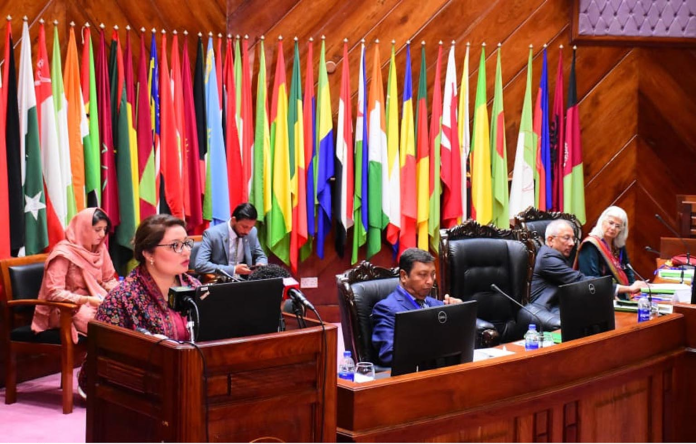ISLAMABAD: FEB 24 (DNA):Coordinator to the Prime Minister for Climate Change, Romina Khurshid Alam here on Monday urged Organisation of Islamic Cooperation (OIC) member states to prioritize water security in their climate action strategies, strengthen intergovernmental collaborations on water governance, facilitate public-private partnerships to invest in water-efficient technologies, and mobilize international climate finance for large-scale water projects.
Addressing the opening ceremony of “Networking of Water Centers of Excellence in OIC Member States” event, Ms. Romina stressed the importance of cooperation among nations sharing transboundary rivers, lakes, and underground water reservoirs to ensure regional stability. “Many of our nations share critical water resources, and cooperation in water governance is essential for regional peace and prosperity.
No single country can tackle these challenges alone,” she said. “The OIC, with its collective strength and shared vision, must step forward as a leader in global water security efforts.” Representatives of water centers from various countries, including Saudi Arabia, Turkey, Morocco, Jordan, Uzbekistan, Kazakhstan, Egypt, Bangladesh, Oman, Pakistan, Qatar, and Russia, attended the event. Ms. Alam highlighted the challenges OIC nations are facing due to climate change, rapid urbanization, and population growth. “Fifteen of the world’s most water-stressed countries belong to the OIC.
Large parts of the Middle East, North Africa, and South Asia, which have significant OIC representation, are facing severe water shortages due to declining groundwater levels, extreme weather events, and inefficient water management practices,” she stated. Drawing attention to the urgency of the issue, she pointed out the devastating impacts of floods, droughts, and glacial melt on water security and economic stability.
“The catastrophic floods of 2022 displaced millions, while prolonged droughts continue to impact our agricultural output,” Ms. Alam added. She further emphasized that Pakistan has made water security a national priority. “Our government has invested in water conservation projects, including rainwater harvesting, smart irrigation, food resilience initiatives, and sustainable water governance policies that align with our climate action commitments,” she said. Ms. Alam underlined the critical importance of research and innovation in tackling water scarcity, stating, “We cannot manage what we do not measure. Data-driven policies, AI-based monitoring, and hydrological forecasting can help us optimize water use.
” She also noted Pakistan’s ongoing initiatives, such as wastewater treatment, groundwater recharge projects, and climate-resilient agriculture techniques, but called for stronger partnerships among OIC member states’ universities, research institutions, and policy think tanks to share knowledge and best practices. Pakistan, she noted, has successfully navigated water-sharing agreements like the Indus Waters Treaty, which serves as a model for other OIC countries dealing with cross-border water challenges. To build on this success, Ms. Alam proposed the establishment of an OIC Water Security Forum, where governments could discuss water-sharing agreements, exchange expertise, and mobilize financial resources for large-scale water infrastructure projects through institutions like the Islamic Development Bank (IsDB). Looking to the future, Ms. Alam called for the adoption of nature-based solutions to enhance water security.
“Investments in reforestation and wetland restoration can improve groundwater recharge. Floodwater harvesting can turn climate-induced disasters into water-saving opportunities, while smart water pricing mechanisms can promote conservation in agriculture and industry,” she said. She highlighted Pakistan’s implementation of the Recharge Pakistan project, which uses floodwater to replenish groundwater and restore ecosystems. “Such initiatives can be scaled up across OIC countries to create long-term, sustainable water management strategies,” she added.
“Pakistan stands ready to work with our OIC partners to develop joint solutions, share research, and build a water-resilient future for all,” she concluded. “Water is not just a national issue; it is a shared responsibility. If we fail to act now, we risk exacerbating the climate and humanitarian crises unfolding before us. However, if we come together—united in our commitment, innovation, and cooperation—we can secure a sustainable future for generations to come.” Ms. Romina called for a renewed commitment to water security across the OIC, emphasizing, “Together, we can turn challenges into opportunities and forge a path toward resilience and sustainability.”

















